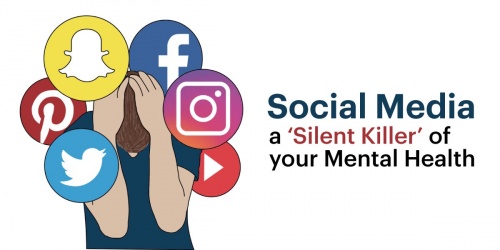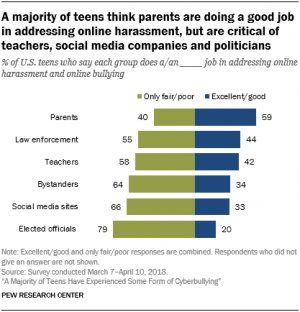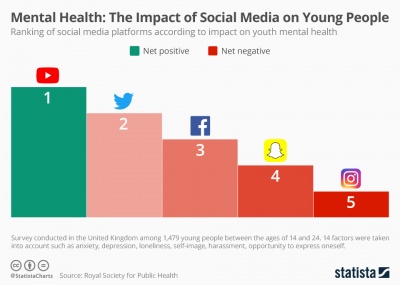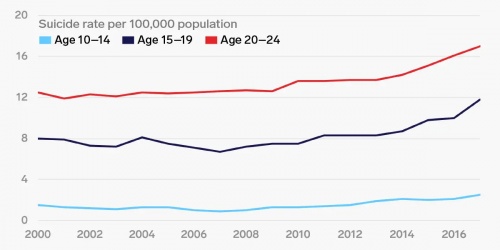Social Media and Depression

Social media and depression is a growing topic of research that is focused on studying how social media usage causes or encourages anxiety and depression. The primary motivator of this research is related to the correlation of increased suicide rates in youth as phone usage has increased [2]. Whether or not social media is the direct cause of increased rates of depression and suicide is still being actively researched [3].
Contents
History
A research article released in 1998 by Kraut et al was one of the first studies to show how the internet affects depression [4]. Some of the findings from the research indicated that internet users of the early-internet had a noticeable decline in communication with friends and family, as well as a general decrease in social life which may cause increased isolation. Following this research, more work was done suggesting a negative impact on a child's development socially [5].
The creation and rise of Facebook in 2004[6] has led to an increased interest in academic research regarding how social media affects the mental health of its users. In 2012, research was released implying that social media may break the stigma against mental health issues surrounding college students[7]. However, other research at the time indicated increased rates of depression and lower grades for young users of social media [8]. Additionally, another study pointed to social media and search engines and the increased risks associated with the ease of discovering suicide methods online [9].
Present Day Research
Today, increased rates of depression, suicide, and anxiety are cause for concern. Up to 66% of highly-active social media users report being depressed compared to less-active social media users [10]. Additionally, suicide rates of teens ages 15 -19 have increased by 76% from 2007-2017[11]. The increase in suicide rates line up with the rise of smartphones and social media usage and is a significant reason for the amount of research being dedicated to social media and mental health.
Additional research indicates that social media causes decreased self-esteem, positive body image, social interaction, physical activity, social confidence[12], as well as may cause addiction and decreased sleep[13]. All of these factors are important for supporting mental health and thus indicate that social media may be exacerbating current mental health problems present in both men and women. It is commonly believed the ways in which social media may cause or contribute to the degradation of healthy mental health factors are rooted in comparison[14]. Users of social media network sites are frequently exposed to idealized versions of other people's lives which can lead to feelings of inadequacy. Further theories relate to the need to stay connected and "catch up" on a user's social circle, as well as the frequent exposure to negative news[15].
Ethical Concerns

Cyberbullying
One major area of concern is related to aggressive or abusive online interactions between complete strangers. These interactions, referred to as "cyberbullying," are when one user is harassed, shamed, belittled, or abused by another user online. These interactions can take place anywhere on the internet, but may be extraordinarily harmful on social media[17]. On social media platforms, the majority of users may know or be acquainted with their "friends" on social media platforms in real life. This connection to their real-life identity can cause extra stress when they are bullied, whether done publicly or privately[18].
Algorithms
Algorithms employed by social media companies have recently been criticized for their ethical practices[19]. The algorithms used by social media platforms recommend content based on interests which may lead to increased exposure of pro-depression and pro-suicide content. Additionally, the financial goals of social media companies may bud into mental health interests, as social media companies try to optimize engagement with the platform. This engagement has led to arguments that social media can be addicting. The ethical criticism of social media companies is that they are knowingly employing algorithms which are designed to encourage constant interaction and engagement that may cause addiction and depression[20].
Privacy
Users of social media sites typically lose all forms of digital privacy[21]. Social media companies collect information users share, post, and message, as well as collect and store their photos, usage data, and more. This constant collection of data allows social media network algorithms to optimize the experience of using the site to sell more ads and increase engagement[22]. Additionally, the open-nature of social media platforms has implications on privacy regarding friends and family. Constant exposure to what a user does online can lead to increased rates of social comparison and pressure.

Envy & Comparison
Social media usage fuels social comparison and envy, an emotion positively correlated with feelings of depression and anxiety. [24] Upward, downward, and nondirectional social comparisons – that is comparing oneself to others in ways that make users feel better, worse, or neutral about themselves – are all associated with increased feelings of depression.[25] This means that users do not have to feel worse about their own lives in order to experience increased depression, but the act of comparison itself is enough to cause greater depressive symptoms. Youth and young adults may be more susceptible to the negative mental-health effects of social comparison on social media because these groups have yet to establish their identities as people.[25] High levels of social comparison often lead to increased levels of envy which is positively correlated with depression and negatively correlated with self-esteem.[26] Because envy is a highly undesirable emotion, it is more difficult for users to admit feelings of envy; this then makes these individuals more susceptible to feelings of depression and anxiety because they cannot be aware of the risks associated with the emotion if they do not acknowledge the emotion itself.[25]
Perfectionism
The design of social media encourages perfectionism and user’s display of highly desirable traits. [27][28] These forums want users to show the most idealized version of themselves. This perfectionism then increases the quality and frequency of social comparison between users on social media, which then increases depressive behavior and anxiety.[27] This is especially true when viewing perfectionism and idealized life perceptions of acquaintances or strangers, rather than friends, on social media.[28] User’s who view overly positive images of strangers and acquaintances are likely to question their own positionality in relation to that of these idealized individuals. This promotion of boastful lifestyles on social media leads to more frequent user comparison in relation to strangers and acquaintances; this social comparison then leads to negative mental health consequences and increased levels of both depression and anxiety.[25][28] Because of this critical flaw of social media design, users are more susceptible to perfectionism and idealized perspective, which in turn makes them more susceptible to depression and anxiety.[24][26][27]
References
- ↑ Emily Daniel. "Social Media a 'Silent Killer' of your Mental Health" Retrieved on 18 March 2021.
- ↑ [Caroline Miller. "Does Social Media Cause Depression?" Retrieved on 12 March 2021.
- ↑ [Betul Keles. "A systematic review: the influence of social media on depression, anxiety and psychological distress in adolescents" Retrieved on 12 March 2021.
- ↑ [R. Kraut, M. Patterson, V. Lundmark, S. Kiesler, T. Mukopadhyay & W. Scherlis. "Internet paradox. A social technology that reduces social involvement and psychological well-being? " Retrieved on 12 March 2021.
- ↑ [K. Subrahmanyam, R. E. Kraut, P. M. Greenfield & E. F. Gross. "The impact of home computer use on children's activities and development" Retrieved on 12 March 2021.
- ↑ [Mark Hall. "Facebook" Retrieved on 12 March 2021.
- ↑ [Megan A. Moreno, Lauren A. Jelenchick, Katie G. Egan, Elizabeth Cox, Henry Young, Kerry E. Gannon & Tara Becker. "Feeling Bad on Facebook: Depression disclosures by college students on a Social Networking Site" Retrieved on 12 March 2021.
- ↑ [Jamie Chamberlin. "Facebook: Friend or foe?" Retrieved on 12 March 2021.
- ↑ [David Luxton, Jennifer June & Jonathan Fairall. "Social Media and Suicide: A Public Health Perspective" Retrieved on 12 March 2021.
- ↑ [Liu Yi Lin et Al. "ASSOCIATION BETWEEN SOCIAL MEDIA USE AND DEPRESSION AMONG U.S. YOUNG ADULTS" Retrieved on 12 March 2021.
- ↑ [Andy Kiersz & Allana Akhtar. "Suicide is Gen Z's second-leading cause of death, and it's a worse epidemic than anything millennials faced at that age" Retrieved on 12 March 2021.
- ↑ [Melissa Hunt, Rachel Marx, Courtney Lipson & Jordyn Young. "No More FOMO: Limiting Social Media Decreases Loneliness and Depression " Retrieved on 12 March 2021.
- ↑ [Holly Shakya & Nicholas Christakis. "A New, More Rigorous Study Confirms: The More You Use Facebook, the Worse You Feel" Retrieved on 12 March 2021.
- ↑ [Yixin Hu, Mengmeng Zhou, Yunru Shao, Jing Wei, Zhenying Li, Shike Xu, Phil Maguire & Dawei Wang. "The effects of social comparison and depressive mood on adolescent social decision-making" Retrieved on 12 March 2021.
- ↑ [Mike Brooks. "Proof That No One Really Cares About Our Social Media Posts" Retrieved on 12 March 2021.
- ↑ [Monica Anderson. "A Majority of Teens Have Experienced Some Form of Cyberbullying" Retrieved on 18 March 2021.
- ↑ [Jamie Zelazny. "The changing demographics of youth suicide — Is social media to blame?" Retrieved on 12 March 2021.
- ↑ [Stop Bullying. "What Is Cyberbullying" Retrieved on 12 March 2021.
- ↑ [Aaron Smith. "Algorithms in action: The content people see on social media" Retrieved on 12 March 2021.
- ↑ [Fazida Karim et Al. "Social Media Use and Its Connection to Mental Health: A Systematic Review" Retrieved on 12 March 2021.
- ↑ [Brooke Auxier, Lee Rainie, Monica Anderson, Andrew Perrin, Madhu Kumar & Erica Turner. "Americans and Privacy: Concerned, Confused and Feeling Lack of Control Over Their Personal Information" Retrieved on 12 March 2021.
- ↑ [Greg McFarlane. "How Facebook, Twitter, Social Media Make Money From You" Retrieved on 12 March 2021.
- ↑ Martin Armstrong. "Mental Health: The Impact of Social Media on Young People" Retrieved on 18 March 2021.
- ↑ 24.0 24.1 [Edson C. Tandoc Jr., Patrick Ferrucci & Margaret Duffy. "Facebook use, envy, and depression among college students: Is facebooking depressing?" Retrieved on 17 March 2021.
- ↑ 25.0 25.1 25.2 25.3 [Mai-Ly N. Steers, Robert E. Wickham & Linda K. Acitelli. "Seeing Everyone Else’s Highlight Reels: How Facebook Usage is Linked to Depressive Symptoms" Retrieved on 17 March 2021.
- ↑ 26.0 26.1 [Helmut Appel, Jan Crusius & Alexander L. Gerlach. "Social Comparison, Envy, and Depression on Facebook: A Study Looking at the Effects of High Comparison Standards on Depressed Individuals" Retrieved on 17 March 2021.
- ↑ 27.0 27.1 27.2 [Emily Hellmann. "Keeping Up Appearances: Perfectionism and Perfectionistic Self-Presentation on Social Media" Retrieved on 17 March 2021.
- ↑ 28.0 28.1 28.2 [Erin Vogel & Jason P. Rose. "Perceptions of Perfection: The Influence of Social Media on Interpersonal Evaluations" Retrieved on 17 March 2021.
